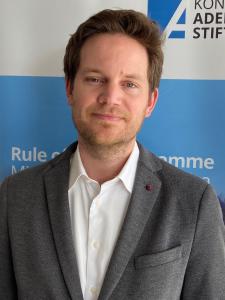Unlike other core state institutions, such as the German Parliament, the Federal Council, or the Federal Government, the rules of procedure of the Federal Constitutional Court are not anchored in the Constitution. This legal loophole is closed pursuant to § 1.3 of the Federal Constitutional Court Act (BVerfGG), according to which the Federal Constitutional Court (FCC) gives itself rules of procedure, which are adopted by the plenum.
The Rules of Procedure are divided into two parts. Part A regulates provisions on the Organisation and Administration of the FCC (§1 – §19 GOBVerfG), whereas Part B, which is again subdivided into ten titles, entails regulations on supplementary procedural provisions (§§20-73 GOBVerfG). The Rules of Procedure govern inter alia details on the drawing of lots (§ 38 GOBVerfG), on the recording of the oral proceedings (§ 24.3 to 7 GOBVerfG), on the casting of a special vote and the notification of the voting ratio (§ 55 GOBVerfG) and on the chairmanship and representation of the so-called delay chamber.
The rules of procedure are adopted by the plenum, the assembly of the constitutional judges of both Senates. Pursuant to §2.4 GOBVerfG, the plenum constitutes a quorum if at least two-thirds of its members - eleven judges - are present. It decides by a majority of the participating judges (corresponding application of § 15.4 sentences 2 BVerfGG). The Rules of Procedure are then published in the Federal Law Gazette (§72 GOBVerfG).
The Rules of Procedure rank below those of a simple federal law. They are merely an internal law and, therefore, not suitable to establish legal effects vis-à-vis third parties. They may only regulate the internal procedural rank, but they are specifically not a suitable place to close actual or alleged loopholes in the BVerfGG. The Rules of Procedure solely create a self-binding effect for the FCC.
Translations into English and French, as well as the German original, can be found on the Website of the FCC:
https://www.bundesverfassungsgericht.de/EN/Verfahren/Rechtsquellen/rechtsquellen_node.html
About this series
Bridging legal language barriers
The rule of law has always, but particularly been noteworthy in the Arab world since the 2011 popular uprisings that reformed the institutions in several countries of the region such as Tunisia, Egypt, Yemen, Libya and more. Laws and rulings present the norms in which society must conduct itself in. In many of the countries in the region, many laws are unimplemented, are selectively implemented or even are impossible to implement. Alongside the slow socio-economic growth these countries are facing – notably due to ongoing crisis across the region -, societies in the MENA region have to some degree still not grown accustomed to the importance of laws and rulings in organizing their societies.
As a result of Germany’s dark Nazi past, the country’s "Basic Law" (Grundgesetz) of 1949 has seen significant value within its people, as they see it as a sign of national pride. The members of the drafting constitutional council spelled out the essence of what they considered to be essential lessons for building a democratic state that upholds the rule of law and protects human dignity (Menschenwürde) against all imaginable future threats. The Grundgesetz created a legal framework for a stable and sustainable democracy, making it an obligation for the executive, legislative and judiciary powers to conform to these laws and the seperation of powers. With time, both laws and rulings have created a stable framework in which society and public institutions simultaneously work together in preserving individual rights.
In Middle Eastern and North African countries, there has been a steady evolution of law and legal systems, resulting from a mix between westernized “modern” influence as well as keeping its traditional values in place. Efforts in modernizing judicial and legal practices using western legal means have been a helpful tool in spreading democracy in the region. As part of this series, the Rule of Law Programme Middle East & North Africa translates court decisions and laws from German into Arabic. These efforts will permit young scholars to explore the importance of legislative and judicial work in developing a sustainable democratic system.
Beirut, 2023; by Philipp Bremer & Ahmad Jenzarli
Philipp Bremer

Head of the Rule of Law Program Middle East and North Africa


